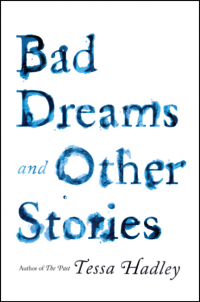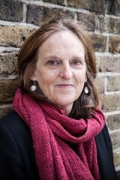 Tessa Hadley is the author of six critically acclaimed novels, in addition to her latest release, Bad Dreams and Other Stories. The beloved author of The Past has proven herself to be the champion of revealing the hidden depths in the deceptively simple, as on display in these amazing stories. Where else would such a great writer find peace and inspiration than in a library? Tessa recently stopped by LLF to share what libraries mean to her.
Tessa Hadley is the author of six critically acclaimed novels, in addition to her latest release, Bad Dreams and Other Stories. The beloved author of The Past has proven herself to be the champion of revealing the hidden depths in the deceptively simple, as on display in these amazing stories. Where else would such a great writer find peace and inspiration than in a library? Tessa recently stopped by LLF to share what libraries mean to her.
***
The University Library
I’m remembering being an undergraduate student in Cambridge in the 1970s. It was a complicated time, I didn’t quite love it and didn’t altogether hate it either. I had one or two wonderful teachers, I made two or three good friends. I’d thought before I went that I might belong in Cambridge finally—be among my own kind. But it turned out to be the same old story as when I joined the Brownies, or Drama Club, or took ballet classes, or went to school camp—I just wasn't good at belonging anywhere. But I did read a lot, and thought a lot, and began to make out the shape of things, and I’m grateful forever for that opportunity and that freedom.
 My room in the first year was in an austere grey block built as a memorial after the First World War, adjacent to the equally austere 1930s University Library—red-brick, architecturally a cross between a station and a cinema. So I could fall out of bed and go into the library to work—which I did rather often, because my room was a handsome new attic conversion only fitted with an electric fan heater. There was no central heating; the older rooms downstairs had lovely gas fires. It was so desperately cold in the Cambridge winter that I had to write essays in the library or in bed, under the duvet with all my clothes on; at least the library was warm.
My room in the first year was in an austere grey block built as a memorial after the First World War, adjacent to the equally austere 1930s University Library—red-brick, architecturally a cross between a station and a cinema. So I could fall out of bed and go into the library to work—which I did rather often, because my room was a handsome new attic conversion only fitted with an electric fan heater. There was no central heating; the older rooms downstairs had lovely gas fires. It was so desperately cold in the Cambridge winter that I had to write essays in the library or in bed, under the duvet with all my clothes on; at least the library was warm.
In those days there was no electronic library catalogue. You heaved out gigantic alphabetical volumes onto a table, searched through the pasted typed slips inside, then put in your written request for books. I loved the religious library hush, the heads bent over desks, the air of shared endeavour. I can vividly recall reading Sophocles in there, and Shakespeare. Looking up from other worlds that made me dizzy with what was possible—in life first, but also in writing—I was surprised to find the place unchanged. And in the long afternoons sometimes I’d build a wall of books for privacy on the long desk, and put my head on my arms, and fall asleep for twenty minutes. I still do that now while I’m writing. The sleep comes like a wave, there’s no help for it, you might as well submerge.
I remember that after I finished my Finals I thought that for sheer pleasure I’d re-read a favourite novel of mine, which I’d loved since I was fifteen, Lewis Grassic Gibbon’s Sunset Song. My copy was at home, so I went into the library to borrow one—I knew I couldn’t take it out, but I thought I’d sit there one last time in the old place, lose myself in the beloved book. But it wasn't that easy. When I put my order in as usual on a paper request form, the librarians queried it disapprovingly. Are you going to use this book for serious study? I take it very seriously, I said. But we can’t just let you have it for light reading. It’s not light, it’s a tragic story. I managed eventually to persuade them. The book arrived, a lovely first edition: and no one had ever opened it before, the pages were uncut. I didn’t mention this to the librarians. Slitting them quietly open with the side of my pencil as I read, I felt I was liberating what was inside, letting it out into the world.
***
Thanks, Tessa! Dive into the "quietly explosive short stories" (Kirkus starred review) in Bad Dreams and Other Stories today.
-Amanda
